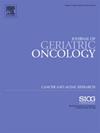在佐治亚州一个服务不足的社区,结直肠癌诊断后年龄相关的生存差异:一项回顾性队列分析
IF 3
3区 医学
Q3 GERIATRICS & GERONTOLOGY
引用次数: 0
摘要
有限的研究调查了格鲁吉亚医疗服务不足地区结直肠癌(CRC)诊断后的诊断年龄和5年总生存率(OS)的差异。研究的目的是检查这种关联,并确定佐治亚州奥古斯塔-里士满县四个年龄组5年生存率的关键因素。材料和方法我们对2012-2022年的数据进行了回顾性队列分析,这些数据来自乔治亚州一家癌症中心的医疗记录和账单数据。采用多变量Cox比例风险回归模型。结果在839例结直肠癌患者中,70岁以上患者的5年生存率最低(54.9%,60-69岁63.4%,50-59岁67.2%,18-49岁67.4%)(p <;0.001)。晚期结直肠癌患者的死亡风险增加2 - 7倍(18-49岁:HR, 5.45;95% ci, 2.28-10.55;50-59岁:HR, 6.72;95% ci, 4.08-11.06;60-69岁:HR 5.98;95% ci, 3.92-9.10;70岁以上:HR 2.21;95% ci, 1.41-3.46)。此外,50 - 59岁前吸烟者的死亡风险增加(HR, 2.16;95% ci, 1.11-4.20)。年龄在60-69岁、生活在持续贫困地区的患者死亡风险也增加(HR, 1.85;95% ci, 1.20-2.85)。讨论不论年龄组,晚期诊断与更高的死亡风险相关。前吸烟者和生活在持续贫困地区的人也分别与50-59岁和60-69岁年龄组的死亡率增加有关。改善公平获得筛查设施/癌症治疗资源和促进健康的生活方式至关重要。本文章由计算机程序翻译,如有差异,请以英文原文为准。
Age-related disparities in survival following colorectal cancer diagnosis in an underserved community in Georgia: A retrospective cohort analysis
Introduction
Limited studies have examined disparities regarding age at diagnosis and 5-year overall survival (OS) following colorectal cancer (CRC) diagnosis within medically underserved areas in Georgia. The study aim was to examine this association and determine key factors of 5-year survival within four age groups in Augusta-Richmond County, Georgia.
Materials and Methods
We conducted a retrospective cohort analysis using 2012–2022 data from an institutional cancer registry linked with medical records and billing data from a single cancer center in Georgia. Multivariable Cox proportional hazard regression models were used.
Results
Among 839 patients with CRC, 5-year survival rates were lowest among patients aged 70+ years (54.9 % vs. 63.4 % for 60–69 years, 67.2 % for 50–59 years, and 67.4 % for 18–49 years) (p < 0.001). Patients with CRC with a late stage at diagnosis were associated with increased risk of death by 2 to 7 times (18–49 years: HR, 5.45; 95 % CI, 2.28–10.55; 50–59 years: HR, 6.72; 95 % CI, 4.08–11.06; 60–69 years: HR, 5.98; 95 % CI, 3.92–9.10; 70+ years: HR, 2.21; 95 % CI, 1.41–3.46). Further, 50–59-year-old former smokers had an increased risk of death (HR, 2.16; 95 % CI, 1.11–4.20). Patients aged 60–69 years and living in persistent poverty areas also had an increased risk of death (HR, 1.85; 95 % CI, 1.20–2.85).
Discussion
Advanced diagnoses were associated with a greater risk of mortality regardless of age group. Former smokers and those living in persistent poverty areas were also linked to increased mortality for 50–59 and 60–69 age groups, respectively. Improving equitable access to screening facilities/ cancer treatment resources and promoting healthy lifestyles are critical.
求助全文
通过发布文献求助,成功后即可免费获取论文全文。
去求助
来源期刊

Journal of geriatric oncology
ONCOLOGY-GERIATRICS & GERONTOLOGY
CiteScore
5.30
自引率
10.00%
发文量
379
审稿时长
80 days
期刊介绍:
The Journal of Geriatric Oncology is an international, multidisciplinary journal which is focused on advancing research in the treatment and survivorship issues of older adults with cancer, as well as literature relevant to education and policy development in geriatric oncology.
The journal welcomes the submission of manuscripts in the following categories:
• Original research articles
• Review articles
• Clinical trials
• Education and training articles
• Short communications
• Perspectives
• Meeting reports
• Letters to the Editor.
 求助内容:
求助内容: 应助结果提醒方式:
应助结果提醒方式:


